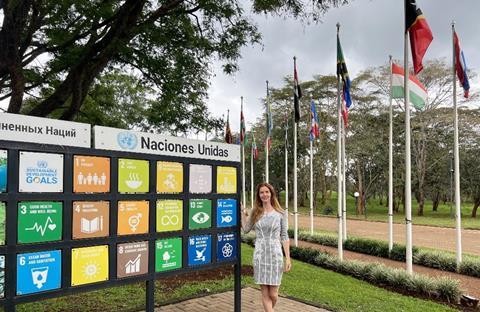
Recent developments in the negotiations for the Global Plastic Treaty have left stakeholders with mixed emotions ranging from disappointment to cautious optimism. As the dust settles from a week of intense talks and unexpected twists, Willemijn Peeters, CEO and founder of circular plastics agency Searious Business, explores the nuanced dynamics of INC-3 – the stormy nights but also the sun shining through the clouds.
Sometimes, working in sustainability, you get hit with challenging times, and last week was a political doozy. It began with an anticlimactic return from Kenya, followed by the disappointing dilution of the European Packaging and Packaging Waste Regulation (PPWR), a surprising U-turn on pesticide control in the Green Deal, and ended with a ‘less-than-favourable’ result in the Dutch general elections. Despite these troubling developments, we don’t have the luxury of resting in the corner, licking our wounds. We must cling to the positive and get ready for the next round.
Deliberate delays, but all is not lost
Regrettably, the negotiations at INC-3 took an unexpected turn, with important decisions hanging in limbo. They couldn’t even settle on how to make the decisions themselves. The frustration was palpable, leaving many questioning the efficacy of the process. Amid all this chaos, a silver lining emerged – recognition of the importance of Reuse to reduce plastic before it becomes pollution - where a few years ago, this wouldn’t even have been on the agenda.
Extended Producer Responsibility (EPR) also took the spotlight as the discussions unfolded. It’s a signal of the redirect downstream to waste management, keeping discussion safely away from anything too controversial, like a cap on production. However, EPR will be a vital mechanism to build and finance national action plans, so it will be good to see further eco-modulation being thoughtfully incorporated.
Thankfully, most people outside the plastic and petroleum industries understand that prevention is better (and cheaper) than cure. The High Ambition Countries agree that we must start from scratch. The question arises: Should the low-ambition countries be excluded from the process? It’s a hot topic that now gets open dialogue and real collective consideration.
Business for the future: Leading by example
Plastic is more than just waste. It demands separate attention across its entire lifecycle – from capping the extraction of new fossil fuels to ruling out chemicals of concern to limiting polymer types, simplifying product design, and supporting alternative delivery models like Reuse.
Businesses working with plastic (packaging) and investors flourish under regulatory certainty. They want clear, legally binding global rules that show them the way forward and create a level playing field for all. Harmonisation became the buzzword in various meeting rooms outside the building, such as the Business Coalition demanding unified rules, standards, definitions, and instruments.
Collaborative action: Beyond diplomacy and politics
There is a concerning lack of agreement on inter-sessional work to be done. With time running out, the impetus for change must extend beyond sluggish diplomacy. Both businesses and individual nations have the power to lead by example, setting industry standards and creating a ripple effect that transcends these bureaucratic delay tactics.
The real work happens outside of the INC. It happens in the NGOs, research institutions, boardrooms and R&D departments of front-running brands and producers who aren’t prepared to wait for foreign dignitaries to decide their fate.
In the meantime, public-private partnerships like EPPIC (End Plastic Pollution International Collaborative) will convene ambitious stakeholders who can galvanise practical action to transform the plastic circular economy before the scope of the Treaty is even confirmed. Impatience really is a virtue here.
The journey to INC-4 in Ottawa may be riddled with challenges, but the collective determination of nations, businesses, and individuals serves as my North Star.
If you liked this article, you might also enjoy:
The L’Oréal approach to packaging sustainability
The way we talk about plastic needs to change – here’s how to get it right
What steps is Apple taking to make its packaging more sustainable?














No comments yet